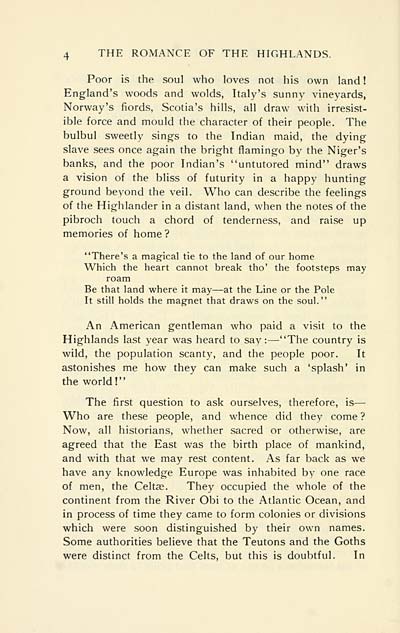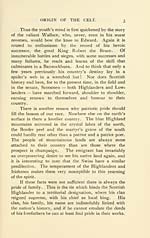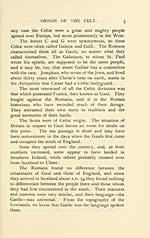Download files
Complete book:
Individual page:
Thumbnail gallery: Grid view | List view

4 THE ROMANCE OF THE HIGHLANDS.
Poor is the soul who loves not his own land !
England's woods and wolds, Italy's sunny vineyards,
Norway's fiords, Scotia's hills, all draw with irresist-
ible force and mould the character of their people. The
bulbul sweetly sings to the Indian maid, the dying
slave sees once again the bright flamingo by the Niger's
banks, and the poor Indian's "untutored mind" draws
a vision of the bliss of futurity in a happy hunting
ground beyond the veil. Who can describe the feelings
of the Highlander in a distant land, when the notes of the
pibroch touch a chord of tenderness, and raise up
memories of home ?
"There's a mag-ical tie to the land of our home
Which the heart cannot break tho' the footsteps may
roam
Be that land where it may — at the Line or the Pole
It still holds the mag-net that draws on the soul."
An American gentleman who paid a visit to the
Highlands last year was heard to say: — "The country is
wild, the population scanty, and the people poor. It
astonishes me how they can make such a 'splash' in
the world!"
The first question to ask ourselves, therefore, is —
Who are these people, and whence did they come ?
Now, all historians, whether sacred or otherwise, are
agreed that the East was the birth place of mankind,
and with that we may rest content. As far back as we
have any knowledge Europe was inhabited by one race
of men, the Celtae. They occupied the whole of the
continent from the River Obi to the Atlantic Ocean, and
in process of time they came to form colonies or divisions
which were soon distinguished by their own names.
Some authorities believe that the Teutons and the Goths
were distinct from the Celts, but this is doubtful. In
Poor is the soul who loves not his own land !
England's woods and wolds, Italy's sunny vineyards,
Norway's fiords, Scotia's hills, all draw with irresist-
ible force and mould the character of their people. The
bulbul sweetly sings to the Indian maid, the dying
slave sees once again the bright flamingo by the Niger's
banks, and the poor Indian's "untutored mind" draws
a vision of the bliss of futurity in a happy hunting
ground beyond the veil. Who can describe the feelings
of the Highlander in a distant land, when the notes of the
pibroch touch a chord of tenderness, and raise up
memories of home ?
"There's a mag-ical tie to the land of our home
Which the heart cannot break tho' the footsteps may
roam
Be that land where it may — at the Line or the Pole
It still holds the mag-net that draws on the soul."
An American gentleman who paid a visit to the
Highlands last year was heard to say: — "The country is
wild, the population scanty, and the people poor. It
astonishes me how they can make such a 'splash' in
the world!"
The first question to ask ourselves, therefore, is —
Who are these people, and whence did they come ?
Now, all historians, whether sacred or otherwise, are
agreed that the East was the birth place of mankind,
and with that we may rest content. As far back as we
have any knowledge Europe was inhabited by one race
of men, the Celtae. They occupied the whole of the
continent from the River Obi to the Atlantic Ocean, and
in process of time they came to form colonies or divisions
which were soon distinguished by their own names.
Some authorities believe that the Teutons and the Goths
were distinct from the Celts, but this is doubtful. In
Set display mode to: Large image | Transcription
Images and transcriptions on this page, including medium image downloads, may be used under the Creative Commons Attribution 4.0 International Licence unless otherwise stated. ![]()
| Early Gaelic Book Collections > Ossian Collection > Romance of the Highlands > (30) |
|---|
| Permanent URL | https://digital.nls.uk/81815985 |
|---|
| Description | Selected books from the Ossian Collection of 327 volumes, originally assembled by J. Norman Methven of Perth. Different editions and translations of James MacPherson's epic poem 'Ossian', some with a map of the 'Kingdom of Connor'. Also secondary material relating to Ossianic poetry and the Ossian controversy. |
|---|
| Description | Selected items from five 'Special and Named Printed Collections'. Includes books in Gaelic and other Celtic languages, works about the Gaels, their languages, literature, culture and history. |
|---|

